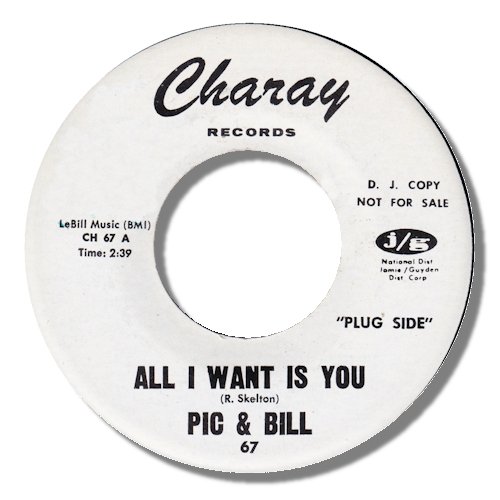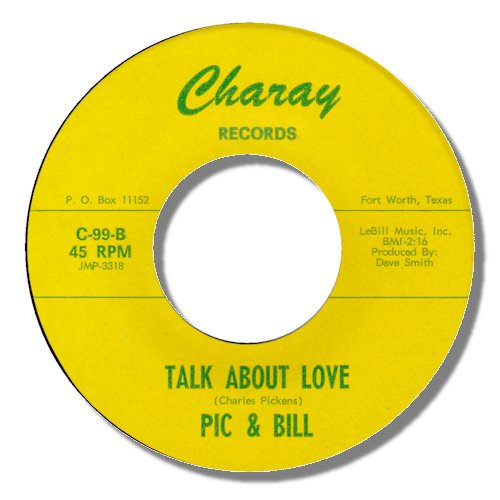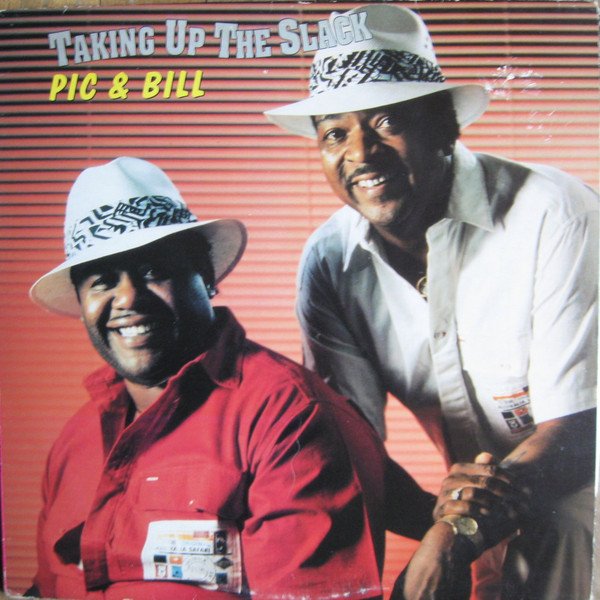 Pic & Bill
Pic & Bill
Although the style has virtually disappeared from the black music scene, the male duo was a very familiar act round the chitlin circuit in the 1960s. In its heyday every label had its own Sam and Dave. Being a lover of the genre, over the years I’ve tried to feature as many of these artists as
I can. Pic and Bill were among the better known names and for a period in the late 1960s were very popular in the South with their heavy brand of soul. And their music can now be called vintage southern soul of the highest class.
Charles Pickens (Pic) and Billy Mills (Bill) were both from North Carolina originally but from 1965 until they split up 5 years later their records were released from Texas, having come to the flaky Major Bill Smith’s attention in Fort Worth, probably as a result of a local gig. In that 5 year period they recorded quite prolifically with 15 or so singles and 1 album released, a testimony to their continuing popularity. Both men were big physically, with big baritone voices to match, and obvious gospel backgrounds. Charles Pickens had slight the higher pitched voice and, although most Pic & Bill’s tracks were nominally produced by the Major, probably had a hand in the arrangements, as well as writing many of the songs.
 But Ashville, NC producer Dave Smith (no relation to the Major) should not be forgotten in the Texas rush. Dave’s name appears as arranger or producer on a number of the duo’s releases and it wouldn’t surprise me at all if at least a few of the tracks they cut weren’t recorded in North Carolina and only leased out to the Major. After all this is what happened to another Carolina singer who “recorded” for Major Bill Smith - Willie Hobbs.
But Ashville, NC producer Dave Smith (no relation to the Major) should not be forgotten in the Texas rush. Dave’s name appears as arranger or producer on a number of the duo’s releases and it wouldn’t surprise me at all if at least a few of the tracks they cut weren’t recorded in North Carolina and only leased out to the Major. After all this is what happened to another Carolina singer who “recorded” for Major Bill Smith - Willie Hobbs.
The first 45 issued What Would I Do / What Does It Take was a rather inauspicious start, a rather lightweight pop-slanted offering on the top, with a frantic uptempo song on the flip. Thanks to the Major’s highly erratic numbering system Charay 60 was home o no less than 6 different 4s! Rather than try to unravel their various release dates, I’ll carry on looking at the songs that graced that number. “Togerther Till The End Of Time” was a tuneful midpaced number with an impassioned Pickens lead. ![]() How Many Times was their first true deep ballad, a Charles solo – and a real winner at that. The tempo certainly suited his righteous fire very well. Their take on the evergreen Joe Hinton smash “Funny How Time Slips Away” is a very worthy effort, as is
How Many Times was their first true deep ballad, a Charles solo – and a real winner at that. The tempo certainly suited his righteous fire very well. Their take on the evergreen Joe Hinton smash “Funny How Time Slips Away” is a very worthy effort, as is ![]() I Love You Baby which I would argue is their first masterpiece. A deep soul ballad full of class, and emotion, on which both Billy and Charles demonstrate their heavyweight vocal talents. “Over The Mountain” has a rather more restrained vocal style, and that plus the background strings make it one of the easiest of the Charay 60’s to date – 1969.
I Love You Baby which I would argue is their first masterpiece. A deep soul ballad full of class, and emotion, on which both Billy and Charles demonstrate their heavyweight vocal talents. “Over The Mountain” has a rather more restrained vocal style, and that plus the background strings make it one of the easiest of the Charay 60’s to date – 1969.
 Moving on from Charay 60 there were many more killer tracks.
Moving on from Charay 60 there were many more killer tracks. ![]() It’s Not You is a brassily insistent dancer featured a riff that pre-dated Moore and Prater’s Soul Sister Brown Sugar by 4 years, and the flip
It’s Not You is a brassily insistent dancer featured a riff that pre-dated Moore and Prater’s Soul Sister Brown Sugar by 4 years, and the flip ![]() All I Want Is You was a superb deep ballad. Both sides had the impassioned, wailing vocals which were to become their trademarks, and which made them cult names in Japanese and European deep soul circles.
All I Want Is You was a superb deep ballad. Both sides had the impassioned, wailing vocals which were to become their trademarks, and which made them cult names in Japanese and European deep soul circles.
Their next Charay release “This Is It” /” Nobody But My Baby” had a disappointing top side but the B sidei s a great “Can I Get a Witness” style romp, powered by a burping baritone sax. The disappointing Beatles cover “Yesterday” with the far superior dancer “Don’t Put Me Down” was the first of their discs to be elased out to an outside label, Smash. Their following release ![]() Just a Tear / “Sad World Without You” was their best to date, and proved to be their biggest seller, going on to be a massive regional hit in the South. And it deserved to be as it was an inspired Pickens ballad given the right emotive treatment. The flip, another Charles Pickens song, was a melodic mid paced item of easy charm. The tracks were again leased out to Smash and the 45 was even picked up for a UK issue on the Page One label. Noting the names Moses Dillard and “A Mark V production” on the various Smash labels makes them dead certs for a Tarheel state recording location.
Just a Tear / “Sad World Without You” was their best to date, and proved to be their biggest seller, going on to be a massive regional hit in the South. And it deserved to be as it was an inspired Pickens ballad given the right emotive treatment. The flip, another Charles Pickens song, was a melodic mid paced item of easy charm. The tracks were again leased out to Smash and the 45 was even picked up for a UK issue on the Page One label. Noting the names Moses Dillard and “A Mark V production” on the various Smash labels makes them dead certs for a Tarheel state recording location.
 In 1968 the guys backed Willie Hobbs on his Soft 45 “Action” / “A Woman Like Her” which also came out on Mercury, as well as issuing their final Smash single, which had the excellent slow soul of Moments Like These coupled with the dramatic “Love Is A Many Splendored Thing”. These two sides both featured a string section behind them – possibly not a very good idea judging by the outcome as it only diluted their gospel fire.
In 1968 the guys backed Willie Hobbs on his Soft 45 “Action” / “A Woman Like Her” which also came out on Mercury, as well as issuing their final Smash single, which had the excellent slow soul of Moments Like These coupled with the dramatic “Love Is A Many Splendored Thing”. These two sides both featured a string section behind them – possibly not a very good idea judging by the outcome as it only diluted their gospel fire.
A superb soulful ballad ![]() Soul Of A Man, the backing for which was also used by Major Bill for Robert Thomas, was released late in 1969 on another Mercury subsidiary, Blue Rock. The flip side, Gonna Give It To You was a typical Charles Pickens dance tune with an almost funky beat, only slightly marred by the use of female backing singers.
Soul Of A Man, the backing for which was also used by Major Bill for Robert Thomas, was released late in 1969 on another Mercury subsidiary, Blue Rock. The flip side, Gonna Give It To You was a typical Charles Pickens dance tune with an almost funky beat, only slightly marred by the use of female backing singers.
 Their penultimate 45, A Man Without A Woman / Talk About Love did not fare so well. The Northern soul favourite “Talk About Love” was another up-tempo number with a strong brass section, and the other side a good version of a song previously recorded by another Major Bill Smith male duo Matt (Brown) and Robert (Thomas) but neither really disturbed the scorers.
Their penultimate 45, A Man Without A Woman / Talk About Love did not fare so well. The Northern soul favourite “Talk About Love” was another up-tempo number with a strong brass section, and the other side a good version of a song previously recorded by another Major Bill Smith male duo Matt (Brown) and Robert (Thomas) but neither really disturbed the scorers.
Pic and Bill had a final 45 on one of Major Bill’s own labels in 1969 when a wailing version of the Sam and Dave classic When Something Is Wrong With My Baby was released with It’s Not You from an earlier 45 on Le Cam 830. Direct comparisons with well-known hitmakers’ songs are always difficult to make, but I think Pic and Bill’s rendering of the Hayes/Porter melody shows comparable power and emotion.
 At about this time Major Bill also issued their only LP. 30 Minutes Of Soul (Le Cam 303) brought together most of their best sides already issued together with four other cuts, mostly from the pen of Charles Pickens. “You Walk So Fine” was a Bill solo over a funky horn section, “Don’t Leave Me” another funky number reminiscent of Brother James’ “Out Of Sight” and “This Is My Story” a version of the old doo-wop classic.
At about this time Major Bill also issued their only LP. 30 Minutes Of Soul (Le Cam 303) brought together most of their best sides already issued together with four other cuts, mostly from the pen of Charles Pickens. “You Walk So Fine” was a Bill solo over a funky horn section, “Don’t Leave Me” another funky number reminiscent of Brother James’ “Out Of Sight” and “This Is My Story” a version of the old doo-wop classic.
After this Billy Mills went on to record one session for Sound Stage 7, a fine version of Ropscoe Shelton’s immortal “Easy Goin’ Fellow” and Charles Pickens presumably dropped out of the business altogether. When interest in Southern soul revived, particularly in Europe and Japan in the 1970s Major Bill reissued the album on 12 O’Clock Records, and one or two previously unissued tracks like A Woman Has A Way, Mills’ excellent solo All These Things and well judged take on Willie Hobbs’ “Under The Pines” appeared on various reissue LPs.
 But the good news was that wasn’t the end of the Pic & Bill story. In 1987 Pic and Bill re-emerged with a 12” on the North Carolina based Bandit label with a strong version of Johnny Bristol’s “Hang On In There Baby”, produced by their old colleague Dave Smith. A recut of their killer “All I Want Is You” also came out and – amazingly enough – a full album “Taking Up The Slack” also appeared in 1990.
But the good news was that wasn’t the end of the Pic & Bill story. In 1987 Pic and Bill re-emerged with a 12” on the North Carolina based Bandit label with a strong version of Johnny Bristol’s “Hang On In There Baby”, produced by their old colleague Dave Smith. A recut of their killer “All I Want Is You” also came out and – amazingly enough – a full album “Taking Up The Slack” also appeared in 1990.
All right, so the production on the duo’s can be a bit raw and occasionally you hear a wrong note or two. But Pic and Bill could really sing a storm and the emotion and power shine through. And in the end isn’t that what soul should really be about?
Discography
A very good discography by Sebastian Fonzeus can be found on Barry Fowden's site here: